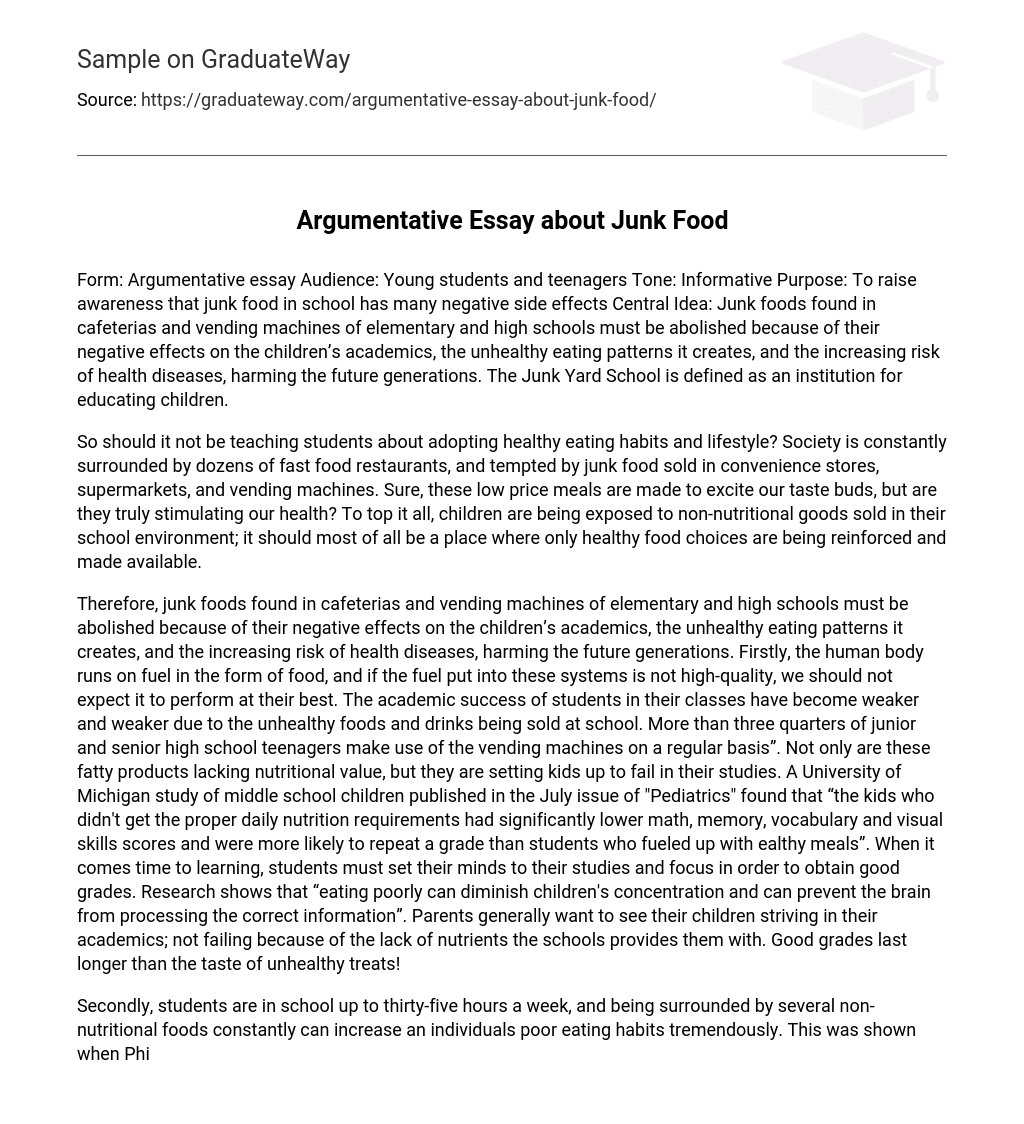It is vital to remove junk foods from primary and secondary school cafeterias and vending machines. This action has several negative consequences: it adversely affects the academic performance of children, promotes unhealthy eating habits, and raises the likelihood of future health issues that can harm future generations.
Isn’t it crucial to teach students about the importance of adopting healthy eating habits and a healthy lifestyle? In our modern society, fast food restaurants are everywhere, and we are constantly tempted by unhealthy snacks found in convenience stores, supermarkets, and vending machines. While these affordable meals may satisfy our cravings, do they genuinely contribute to our overall health? Additionally, children are exposed to non-nutritious items within their school surroundings. Therefore, schools must prioritize promoting and offering only nutritious food options.
Eliminating junk foods from elementary and high school cafeterias and vending machines is essential for maintaining optimal performance. These unhealthy foods have a negative impact on children’s academic achievements, encourage poor eating habits, and increase the likelihood of diseases that can harm future generations. It is important to provide nourishing fuel in the form of nutritious food to support the body’s needs.
Research conducted at the University of Michigan has found that unhealthy foods and drinks sold at school are negatively impacting students’ academic performance. Middle school children who do not meet their daily nutritional requirements tend to have lower scores in math, memory, vocabulary, and visual skills. They also have a higher chance of repeating a grade compared to peers who consume healthy meals. Furthermore, over 75% of junior and senior high school teenagers regularly use vending machines that provide nutritionally deficient products.
Research suggests that students must maintain concentration and focus in order to attain satisfactory academic performance. Moreover, studies indicate that poor eating habits can negatively impact concentration and impede cognitive function. Consequently, parents prioritize their children’s educational success and advocate for schools to provide nutritious meals rather than compromising grades due to inadequate nutrients. In conclusion, achieving excellent grades takes precedence over temporarily indulging in unhealthy snacks!
Additionally, the continuous availability of unhealthy food choices at schools can greatly worsen a person’s unhealthy eating patterns. A study conducted from 1998 to 2007 monitored numerous children throughout the United States from kindergarten to eighth grade. The study found that 79% of students relied on school cafeterias and vending machines for their meals and snacks. Furthermore, it was discovered that during their time at school, 85% of these students increased their intake of non-nutritious foods by 48%. This increase was largely attributed to the convenient access provided by cafeteria services and snack machines.
The U.S. Department of Agriculture states that school lunches typically contain processed and refined foods with high amounts of sugar, fats, and calories. The majority (90%) of school lunch programs fail to meet the nutritional standards set by the U.S. government. Students who depend on these lunches consume more fatty meals and sugary beverages but consume fewer fruits and vegetables compared to students who bring their own lunches.
More than half of students in schools are impacted by unhealthy eating habits, which also makes them more susceptible to future health problems. Eating unhealthy food while at school greatly increases the chances of children and teenagers developing health conditions that can harm their overall well-being.
Unhealthy eating is linked to various health problems, such as heart disease, diabetes, obesity, hypertension, stroke, osteoporosis, and different cancers. It is concerning that unhealthy junk foods in schools have contributed to the increase of these illnesses among young individuals. Within the last two decades alone, the number of overweight teenagers has almost tripled. This rise in obesity among children and adolescents results in significant health concerns since conditions like type 2 diabetes, high blood pressure, and high cholesterol are now being diagnosed at younger ages.
School lunches, beverage and snack machines are thought to be a factor in the rising rates of obesity, according to research from the American College of Cardiology. The study found that children who participate in the National School Lunch Program are more likely to be obese compared to those who bring their own meals. This not only affects individuals consuming these low-quality foods but also has consequences for future generations. Inheriting unhealthy eating habits from family members can lead to more severe health issues. More than 70% of overweight or obese teenagers continue to face weight problems into adulthood.
It is crucial to remove unhealthy food from elementary and high school cafeterias and vending machines. This is because it negatively affects children’s academic performance, encourages unhealthy eating habits, and contributes to future health problems. It is disappointing that schools, which are responsible for teaching children about making good choices, offer these fatty products.
To create a secure and comprehensive environment, schools should remove all unhealthy food choices from their cafeterias and vending machines. This step will have a positive effect on students’ physical health, academic achievements, and future prospects. By implementing these tactics, we can expect a decrease in youth health issues, improved scholastic performance, and enhanced overall well-being for future generations.





